Fleurs du Mal Magazine


Or see the index
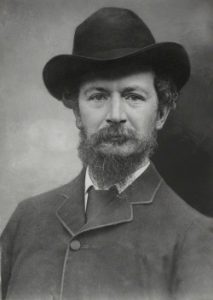
The Complaint of Lisa
(Double Sestina)
Decameron, x. 7
There is no woman living that draws breath
So sad as I, though all things sadden her.
There is not one upon life’s weariest way
Who is weary as I am weary of all but death.
Toward whom I look as looks the sunflower
All day with all his whole soul toward the sun;
While in the sun’s sight I make moan all day,
And all night on my sleepless maiden bed
Weep and call out on death, O Love, and thee,
That thou or he would take me to the dead,
And know not what thing evil I have done
That life should lay such heavy hand on me.
Alas, Love, what is this thou wouldst with me?
What honour shalt thou have to quench my breath,
Or what shall my heart broken profit thee?
O Love, O great god Love, what have I done,
That thou shouldst hunger so after my death?
My heart is harmless as my life’s first day:
Seek out some false fair woman, and plague her
Till her tears even as my tears fill her bed:
I am the least flower in thy flowery way,
But till my time be come that I be dead
Let me live out my flower-time in the sun
Though my leaves shut before the sunflower.
O Love, Love, Love, the kingly sunflower!
Shall he the sun hath looked on look on me,
That live down here in shade, out of the sun,
Here living in the sorrow and shadow of death?
Shall he that feeds his heart full of the day
Care to give mine eyes light, or my lips breath?
Because she loves him shall my lord love her
Who is as a worm in my lord’s kingly way?
I shall not see him or know him alive or dead;
But thou, I know thee, O Love, and pray to thee
That in brief while my brief life-days be done,
And the worm quickly make my marriage-bed.
For underground there is no sleepless bed:
But here since I beheld my sunflower
These eyes have slept not, seeing all night and day
His sunlike eyes, and face fronting the sun.
Wherefore if anywhere be any death,
I would fain find and fold him fast to me,
That I may sleep with the world’s eldest dead,
With her that died seven centuries since, and her
That went last night down the night-wandering way.
For this is sleep indeed, when labour is done,
Without love, without dreams, and without breath,
And without thought, O name unnamed! of thee.
Ah, but, forgetting all things, shall I thee?
Wilt thou not be as now about my bed
There underground as here before the sun?
Shall not thy vision vex me alive and dead,
Thy moving vision without form or breath?
I read long since the bitter tale of her
Who read the tale of Launcelot on a day,
And died, and had no quiet after death,
But was moved ever along a weary way,
Lost with her love in the underworld; ah me,
O my king, O my lordly sunflower,
Would God to me too such a thing were done!
But if such sweet and bitter things be done,
Then, flying from life, I shall not fly from thee.
For in that living world without a sun
Thy vision will lay hold upon me dead,
And meet and mock me, and mar my peace in death.
Yet if being wroth God had such pity on her,
Who was a sinner and foolish in her day,
That even in hell they twain should breathe one breath,
Why should he not in some wise pity me?
So if I sleep not in my soft strait bed
I may look up and see my sunflower
As he the sun, in some divine strange way.
O poor my heart, well knowest thou in what way
This sore sweet evil unto us was done.
For on a holy and a heavy day
I was arisen out of my still small bed
To see the knights tilt, and one said to me
“The king,” and seeing him, somewhat stopped my breath,
And if the girl spake more, I heard not her,
For only I saw what I shall see when dead,
A kingly flower of knights, a sunflower,
That shone against the sunlight like the sun,
And like a fire, O heart, consuming thee,
The fire of love that lights the pyre of death.
Howbeit I shall not die an evil death
Who have loved in such a sad and sinless way,
That this my love, lord, was no shame to thee.
So when mine eyes are shut against the sun,
O my soul’s sun, O the world’s sunflower,
Thou nor no man will quite despise me dead.
And dying I pray with all my low last breath
That thy whole life may be as was that day,
That feast-day that made trothplight death and me,
Giving the world light of thy great deeds done;
And that fair face brightening thy bridal bed,
That God be good as God hath been to her.
That all things goodly and glad remain with her,
All things that make glad life and goodly death;
That as a bee sucks from a sunflower
Honey, when summer draws delighted breath,
Her soul may drink of thy soul in like way,
And love make life a fruitful marriage-bed
Where day may bring forth fruits of joy to day
And night to night till days and nights be dead.
And as she gives light of her love to thee,
Give thou to her the old glory of days long done;
And either give some heat of light to me,
To warm me where I sleep without the sun.
O sunflower made drunken with the sun,
O knight whose lady’s heart draws thine to her,
Great king, glad lover, I have a word to thee.
There is a weed lives out of the sun’s way,
Hid from the heat deep in the meadow’s bed,
That swoons and whitens at the wind’s least breath,
A flower star-shaped, that all a summer day
Will gaze her soul out on the sunflower
For very love till twilight finds her dead.
But the great sunflower heeds not her poor death,
Knows not when all her loving life is done;
And so much knows my lord the king of me.
Aye, all day long he has no eye for me;
With golden eye following the golden sun
From rose-coloured to purple-pillowed bed,
From birthplace to the flame-lit place of death,
From eastern end to western of his way.
So mine eye follows thee, my sunflower,
So the white star-flower turns and yearns to thee,
The sick weak weed, not well alive or dead,
Trod underfoot if any pass by her,
Pale, without colour of summer or summer breath
In the shrunk shuddering petals, that have done
No work but love, and die before the day.
But thou, to-day, to-morrow, and every day,
Be glad and great, O love whose love slays me.
Thy fervent flower made fruitful from the sun
Shall drop its golden seed in the world’s way,
That all men thereof nourished shall praise thee
For grain and flower and fruit of works well done;
Till thy shed seed, O shining sunflower,
Bring forth such growth of the world’s garden-bed
As like the sun shall outlive age and death.
And yet I would thine heart had heed of her
Who loves thee alive; but not till she be dead.
Come, Love, then, quickly, and take her utmost breath.
Song, speak for me who am dumb as are the dead;
From my sad bed of tears I send forth thee,
To fly all day from sun’s birth to sun’s death
Down the sun’s way after the flying sun,
For love of her that gave thee wings and breath,
Ere day be done, to seek the sunflower.
Algernon Charles Swinburne
(1837-1909)
The Complaint of Lisa
(Double Sestina)
Decameron, x. 7
• fleursdumal.nl magazine
More in: # Classic Poetry Archive, Archive S-T, Archive S-T, CLASSIC POETRY, Swinburne, Algernon Charles
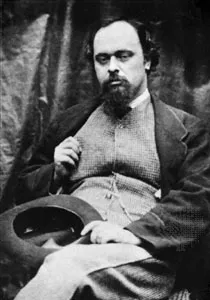
Insomnia
Thin are the night-skirts left behind
By daybreak hours that onward creep,
And thin, alas! the shred of sleep
That wavers with the spirit’s wind:
But in half-dreams that shift and roll
And still remember and forget,
My soul this hour has drawn your soul
A little nearer yet.
Our lives, most dear, are never near,
Our thoughts are never far apart,
Though all that draws us heart to heart
Seems fainter now and now more clear.
To-night Love claims his full control,
And with desire and with regret
My soul this hour has drawn your soul
A little nearer yet.
Is there a home where heavy earth
Melts to bright air that breathes no pain,
Where water leaves no thirst again
And springing fire is Love’s new birth?
If faith long bound to one true goal
May there at length its hope beget,
My soul that hour shall draw your soul
For ever nearer yet.
Dante Gabriel Rossetti
(1828 – 1882)
Insomnia
• fleursdumal.nl magazine
More in: #Editors Choice Archiv, *The Pre-Raphaelites Archive, Archive Q-R, Archive Q-R, Rossetti, Dante Gabriel

Autumn
I dwell alone – I dwell alone, alone,
Whilst full my river flows down to the sea,
Gilded with flashing boats
That bring no friend to me:
O love-songs, gurgling from a hundred throats,
O love-pangs, let me be.
Fair fall the freighted boats which gold and stone
And spices bear to sea:
Slim, gleaming maidens swell their mellow notes,
Love-promising, entreating –
Ah! sweet, but fleeting –
Beneath the shivering, snow-white sails.
Hush! the wind flags and fails –
Hush! they will lie becalmed in sight of strand –
Sight of my strand, where I do dwell alone;
Their songs wake singing echoes in my land –
They cannot hear me moan.
One latest, solitary swallow flies
Across the sea, rough autumn-tempest tossed,
Poor bird, shall it be lost?
Dropped down into this uncongenial sea,
With no kind eyes
To watch it while it dies,
Unguessed, uncared for, free:
Set free at last,
The short pang past,
In sleep, in death, in dreamless sleep locked fast.
Mine avenue is all a growth of oaks,
Some rent by thunder strokes,
Some rustling leaves and acorns in the breeze;
Fair fall my fertile trees,
That rear their goodly heads, and live at ease.
A spider’s web blocks all mine avenue;
He catches down and foolish painted flies
That spider wary and wise.
Each morn it hangs a rainbow strung with dew
Betwixt boughs green with sap,
So fair, few creatures guess it is a trap:
I will not mar the web,
Though sad I am to see the small lives ebb.
It shakes – my trees shake – for a wind is roused
In cavern where it housed:
Each white and quivering sail,
Of boats among the water leaves
Hollows and strains in the full-throated gale:
Each maiden sings again –
Each languid maiden, whom the calm
Had lulled to sleep with rest and spice and balm
Miles down my river to the sea
They float and wane,
Long miles away from me.
Perhaps they say: ‘She grieves,
Uplifted, like a beacon, on her tower.’
Perhaps they say: ‘One hour
More, and we dance among the golden sheaves.’
Perhaps they say: ‘One hour
More, and we stand,
Face to face, hand in hand;
Make haste, O slack gale, to the looked-for land!’
My trees are not in flower,
I have no bower,
And gusty creaks my tower,
And lonesome, very lonesome, is my strand.
Christina Georgina Rossetti
(1830 – 1894)
Autumn
• fleursdumal.nl magazine
More in: 4SEASONS#Autumn, Archive Q-R, Archive Q-R, Rossetti, Christina
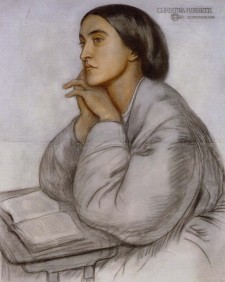
Summer
Winter is cold-hearted
Spring is yea and nay,
Autumn is a weather-cock
Blown every way:
Summer days for me
When every leaf is on its tree;
When Robin’s not a beggar,
And Jenny Wren’s a bride,
And larks hang singing, singing, singing,
Over the wheat-fields wide,
And anchored lilies ride,
And the pendulum spider
Swings from side to side,
And blue-black beetles transact business,
And gnats fly in a host,
And furry caterpillars hasten
That no time be lost,
And moths grow fat and thrive,
And ladybirds arrive.
Before green apples blush,
Before green nuts embrown,
Why, one day in the country
Is worth a month in town;
Is worth a day and a year
Of the dusty, musty, lag-last fashion
That days drone elsewhere.
Christina Georgina Rossetti
(1830 – 1894)
Summer
• fleursdumal.nl magazine
More in: 4SEASONS#Summer, Archive Q-R, Archive Q-R, Rossetti, Christina
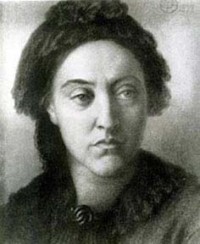
Spring
Frost-locked all the winter,
Seeds, and roots, and stones of fruits,
What shall make their sap ascend
That they may put forth shoots?
Tips of tender green,
Leaf, or blade, or sheath;
Telling of the hidden life
That breaks forth underneath,
Life nursed in its grave by Death.
Blows the thaw-wind pleasantly,
Drips the soaking rain,
By fits looks down the waking sun:
Young grass springs on the plain;
Young leaves clothe early hedgerow trees;
Seeds, and roots, and stones of fruits,
Swollen with sap put forth their shoots;
Curled-headed ferns sprout in the lane;
Birds sing and pair again.
There is no time like Spring,
When life’s alive in everything,
Before new nestlings sing,
Before cleft swallows speed their journey back
Along the trackless track–
God guides their wing,
He spreads their table that they nothing lack,–
Before the daisy grows a common flower,
Before the sun has power
To scorch the world up in his noontide hour.
There is no time like Spring,
Like Spring that passes by;
There is no life like Spring-life born to die,–
Piercing the sod,
Clothing the uncouth clod,
Hatched in the nest,
Fledged on the windy bough,
Strong on the wing:
There is no time like Spring that passes by,
Now newly born, and now
Hastening to die.
Christina Georgina Rossetti
(1830 – 1894)
Spring
• fleursdumal.nl magazine
More in: 4SEASONS#Spring, Archive Q-R, Archive Q-R, Rossetti, Christina
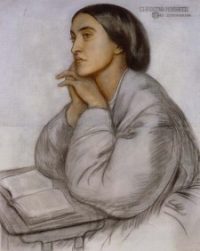
A Wintry Sonnet
A robin said: The Spring will never come,
And I shall never care to build again.
A Rosebush said: These frosts are wearisome,
My sap will never stir for sun or rain.
The half Moon said: These nights are fogged and slow,
I neither care to wax nor care to wane.
The Ocean said: I thirst from long ago,
Because earth’s rivers cannot fill the main.
When springtime came, red Robin built a nest,
And trilled a lover’s song in sheer delight.
Gray hoarfrost vanished, and the Rose with might
Clothed her in leaves and buds of crimson core.
The dim Moon brightened. Ocean sunned his crest,
Dimpled his blue, – yet thirsted evermore.
Christina Georgina Rossetti
(1830 – 1894)
A Wintry Sonnet
• fleursdumal.nl magazine
More in: 4SEASONS#Winter, Archive Q-R, Archive Q-R, Rossetti, Christina

Winter: My Secret
I tell my secret? No indeed, not I:
Perhaps some day, who knows?
But not to-day; it froze, and blows, and snows,
And you’re too curious: fie!
You want to hear it? well:
Only, my secret’s mine, and I won’t tell.
Or, after all, perhaps there’s none:
Suppose there is no secret after all,
But only just my fun.
To-day’s a nipping day, a biting day;
In which one wants a shawl,
A veil, a cloak, and other wraps:
I cannot ope to every one who taps,
And let the draughts come whistling through my hall;
Come bounding and surrounding me,
Come buffeting, astounding me,
Nipping and clipping through my wraps and all.
I wear my mask for warmth: who ever shows
His nose to Russian snows
To be pecked at by every wind that blows?
You would not peck? I thank you for good-will,
Believe, but leave that truth untested still.
Spring’s an expansive time: yet I don’t trust
March with its peck of dust,
Nor April with its rainbow-crowned brief showers,
Nor even May, whose flowers
One frost may wither through the sunless hours.
Perhaps some languid summer day,
When drowsy birds sing less and less,
And golden fruit is ripening to excess,
If there’s not too much sun nor too much cloud,
And the warm wind is neither still nor loud,
Perhaps my secret I may say,
Or you may guess.
Christina Georgina Rossetti
(1830 – 1894)
Winter: My Secret
• fleursdumal.nl magazine
More in: 4SEASONS#Winter, Archive Q-R, Archive Q-R, Rossetti, Christina
major exhibition devoted to
the radical Rossetti generation
in Tate Britain
from 6 April until 24 September 2023
This exhibition follows the romance and radicalism of the Rossetti generation, through and beyond the Pre-Raphaelite years: Dante Gabriel, Christina and Elizabeth (née Siddal). Visitors will get to experience world-renowned works from their boundary-pushing careers.
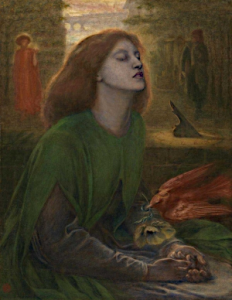 The Rossettis’ approach to art, love and lifestyles are considered revolutionary, and this will be thoroughly explored in an immersive show, using spoken poetry, drawings, paintings, photography, design and more.
The Rossettis’ approach to art, love and lifestyles are considered revolutionary, and this will be thoroughly explored in an immersive show, using spoken poetry, drawings, paintings, photography, design and more.
This is the first retrospective of Dante Gabriel Rossetti at Tate and the largest exhibition of his iconic pictures in two decades.
It will also be the most comprehensive exhibition of Elizabeth Siddal’s work for 30 years, featuring rare surviving watercolours and important drawings.
The Rossettis will take a fresh look at the fascinating myths surrounding the unconventional relationships between Dante Gabriel Rossetti, Elizabeth Siddal, Fanny Cornforth and Jane Morris.
The Rossettis exhibition book
by Carol Jacobi and James Finch
hardback
Dimensions 27.5 x 23 cm
Material FSC certified paper and card
ISBN 9781849768412
£40
This visually captivating hardback exhibition book is devoted to the radical Rossetti generation.
Explore the Rossettis’ revolutionary approach to art, love and lifestyles through a collection of thematic essays containing fresh and surprising research, accompanied by beautiful Pre-Raphaelite illustrations.
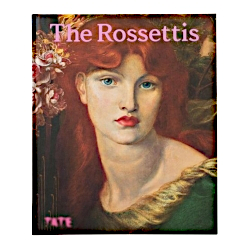 The Rossettis takes a fresh look at the fascinating myths surrounding the unconventional relationships between Dante Gabriel Rossetti, Elizabeth Siddal, Fanny Cornforth and Jane Morris. Featuring artworks and writings by Dante Gabriel, Christina and Elizabeth (née Siddal), the book distinguishes the Rossettis and foregrounds their countercultural roles.
The Rossettis takes a fresh look at the fascinating myths surrounding the unconventional relationships between Dante Gabriel Rossetti, Elizabeth Siddal, Fanny Cornforth and Jane Morris. Featuring artworks and writings by Dante Gabriel, Christina and Elizabeth (née Siddal), the book distinguishes the Rossettis and foregrounds their countercultural roles.
The catalogue accompanies the first retrospective of Dante Gabriel Rossetti at Tate and the largest exhibition of his iconic pictures in two decades, and what will also be the most comprehensive exhibition of Elizabeth Siddal’s work for 30 years, featuring rare surviving watercolours and important drawings.
The publication is edited by Carol Jacobi, Curator, British Art 1850—1915 at Tate and James Finch, Assistant Curator, Nineteenth Century Art at Tate. It features contributions by:
– Chiedza Mhondoro, Assistant Curator, Historic British Art at Tate – Dinah Roe, Reader in Nineteenth Century Literature at Oxford Brookes University – Glenda Youde, a writer and researcher based at University of York – Liz Prettejohn, Professor of Art History at University of York – Jan Marsh, a writer, curator and specialist in the Pre-Raphaelite period – Gursimran Oberoi, an associate teaching fellow at University of Surrey – Margaretta S. Frederick, the former Annette Woolard-Provine Curator of the Bancroft Collection of Pre-Raphaelite Art at Delaware Art Museum – Wendy Parkins, Professor of Victorian Literature and the Director of the Centre for Victorian Literature and Culture at the University of Kent
• fleursdumal.nl magazine
More in: *The Pre-Raphaelites Archive, - Book News, - Bookstores, Archive Q-R, Archive Q-R, Art & Literature News, Exhibition Archive, FDM in London, History of Britain, Illustrators, Illustration, Morris, William, Rossetti, Christina, Rossetti, Dante Gabriel, Siddal, Lizzy
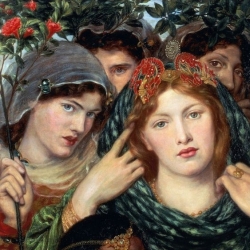
A New-Year’s Burden
Along the grass sweet airs are blown
Our way this day in Spring.
Of all the songs that we have known
Now which one shall we sing?
Not that, my love, ah no!—
Not this, my love? why, so!—
Yet both were ours, but hours will come and go.
The grove is all a pale frail mist,
The new year sucks the sun.
Of all the kisses that we kissed
Now which shall be the one?
Not that my love, ah no!—
Not this, my love?—heigh-ho
For all the sweets that all the winds can blow!
The branches cross above our eyes,
The skies are in a net:
And what’s the thing beneath the skies
We two would most forget?
Not birth, my love, no, no,—
Not death, my love, no, no,—
The love once ours, but ours long hours ago.
Dante Gabriel Rossetti
(1828 – 1882)
A New-Year’s Burden
• fleursdumal.nl magazine
More in: *The Pre-Raphaelites Archive, Archive Q-R, Archive Q-R, Lizzy Siddal, Rossetti, Dante Gabriel
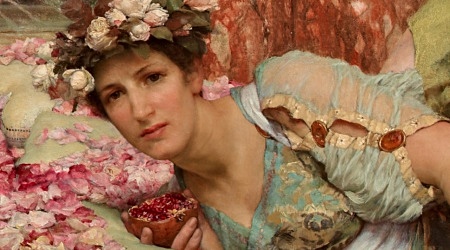
alma-tadema (1836 – 1912)
de meest succesvolle schilder van de 19e eeuw
Verleidelijke Romeinse vrouwen gesluierd in fijne gewaden tegen dromerige vergezichten, mijmerende geliefden op bijna doorschijnend marmeren bankjes en dames die hun tijd doorbrengen met pootjebaden, vissen voeren en luieren. Maar ook een farao met zijn stervende zoon in zijn armen en een nietsvermoedend feestend gezelschap dat elk moment verstikt gaat worden onder een lawine van rozenblaadjes. Alma-Tadema neemt ons mee naar scenes uit de klassieke oudheid en brengt deze tijd, als eerste, echt tot leven. Hij verbeeldt de oudheid zo mooi en overtuigend, dat regisseurs zijn schilderijen gebruiken als blauwdruk voor spektakelfilms als Gladiator. Uit heel de wereld komen meer dan tachtig topschilderijen van een van de meest succesvolle schilders van de 19de eeuw naar Leeuwarden. Samen met persoonlijke voorwerpen en filmfragmenten geven zij een inkijk in zijn wereld.
van lourens naar sir lawrence
Alma-Tadema wordt in 1836 geboren als de Friese Lourens. Na zijn opleiding aan de kunstacademie in Antwerpen vertrekt hij voor de liefde naar Londen, waar hij zich laat naturaliseren tot Engelsman en zichzelf Lawrence gaat noemen. Al snel wordt hij ontdekt door het grote publiek en zijn roem is ongekend, vooral in Engeland en Amerika. In 1899 wordt hij zelfs geridderd en gaat voortaan als Sir door het leven. Alma-Tadema stierf in 1912 en ligt begraven in de St. Paul’s Cathedral in Londen.
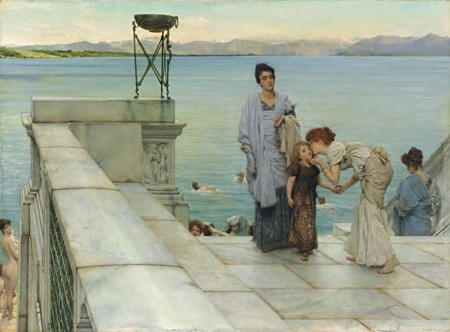
wereldfaam
Tijdens zijn leven wordt Alma-Tadema wereldberoemd met zijn werk. Hij schildert in opdracht van welgestelde zakenlieden en weet als geen ander zijn netwerk te cultiveren. Als een ware entertainer vermaakt hij op chique soirees de Londense high society. De opdrachten blijven binnenstromen en Tadema verdient een fortuin. Zo wordt hij een van de meest succesvolle schilders van de 19de eeuw. Ook tegenwoordig zijn werken van de geridderde schilder in het bezit van grote namen als George Lucas, de steenrijke Amerikaanse William Vanderbilt, de Getty familie, Andrew Lloyd Webber en Jack Nicholson. Zelfs ons koningshuis is de trotste eigenaar van een Tadema.
tadema en hollywood
Sinds zijn huwelijksreis naar Rome en Pompeï is Alma-Tadema gefascineerd door de klassieke oudheid. Hij is de eerste schilder die deze tijd met zoveel zorg en precisie in beeld brengt. Menig regisseur baseert zich op zijn schilderijen bij het maken van historische blockbusters zoals The Ten Commandments(1956). Ook nu nog; Tadema’s werk is een directe inspiratiebron voor Ridley Scott voor Gladiator (2000). In de tentoonstelling wordt glashelder hoe Tadema de filmwereld heeft beïnvloed. Daarnaast is er een bijpassend filmprogramma in samenwerking met Slieker Film en EYE filmmuseum.
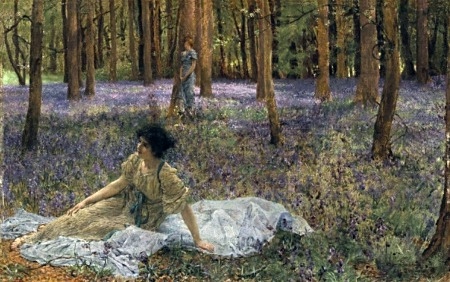
grootste collectie
Het museum beschikte al over de grootste Alma-Tadema-collectie van Nederland, deels gekregen van Alma-Tadema en zijn dochters Laurence en Anna. In het najaar van 2015 doet het Fries Museum de grootste aankoop uit de historie van het museum: Tadema’s Entrance of the theatre. Door deze aankoop kan het Fries Museum als enige museum in Nederland de volledige ontwikkeling tonen die de schilder in zijn carrière doormaakte.
audiotour
Alma-Tadema wekt met zijn schilderijen verhalen uit de oudheid tot leven. Maar welke verhalen vertelt hij eigenlijk en welke symboliek schuilt er achter de objecten die we in zijn werken zien? In een levendige audiotour vertelt acteur Peter Tuinman je alles over zeventien hoogtepunten van de tentoonstelling. Je kiest zelf over welke schilderijen je meer wilt horen waardoor je in alle vrijheid door de tentoonstelling kunt lopen. De verhalentour kost slechts € 1,- per persoon en is ook online te reserveren. Voor buitenlandse bezoekers is er een Engelstalige Storytour beschikbaar.
Het Fries Museum heeft voor deze vernieuwende tentoonstelling over Alma-Tadema de Turing Toekenning 2015 gewonnen. De Turing Foundation kent deze prijs ter waarde van 500.000 euro eens in de twee jaar toe voor het beste tentoonstellingsplan van een Nederlands museum.
De tentoonstelling Alma-Tadema, klassieke verleiding is onderdeel van Leeuwarden-Fryslân Culturele Hoofdstad van Europa 2018. Voor deze tentoonstelling en het begeleidende filmprogramma werkt het Fries Museum samen met EYE filmmuseum en Slieker Film.
Alma-Tadema – klassieke verleiding is nog te zien tot en met 7 februari 2017.
Fries Museum
Wilhelminaplein 92
8911 BS Leeuwarden
T: 058 255 55 00
# Meer info op website friesmuseum
fleurdumal.nl magazine
More in: *The Pre-Raphaelites Archive, Art & Literature News, Exhibition Archive, The Ideal Woman, The talk of the town
De kunstenaar en zijn muze: liefde, begeerte, desillusie en onontkoombare verbondenheid
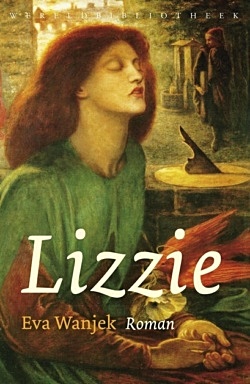 Een onconventionele relatie tussen twee bijzondere mensen leidt hen naar de toppen van de roem, maar ook naar afgronden van ellende en vertwijfeling: van drank, opium en vooral wederzijdse afhankelijkheid. Het is de symbiotische relatie van een gedreven kunstenaar die alles – ook zijn eigen geluk en dat van anderen – opoffert voor de kunst, en een vrouw die haar bestaansrecht ontleent aan haar uitzonderlijke schoonheid, terwijl ze faalt in haar eigen artistieke ambities.
Een onconventionele relatie tussen twee bijzondere mensen leidt hen naar de toppen van de roem, maar ook naar afgronden van ellende en vertwijfeling: van drank, opium en vooral wederzijdse afhankelijkheid. Het is de symbiotische relatie van een gedreven kunstenaar die alles – ook zijn eigen geluk en dat van anderen – opoffert voor de kunst, en een vrouw die haar bestaansrecht ontleent aan haar uitzonderlijke schoonheid, terwijl ze faalt in haar eigen artistieke ambities.
Lizzie geeft een levendig en panoramisch beeld van het bruisende Londen van de 19de eeuw, met zijn culturele elite, zijn bohémiens en zijn zelfkant. Hij biedt zowel kostuumdrama en ‘Gothic horror’ als erotische en indringende psychologische scènes. Het is een groots opgezet drama, van de allereerste ontmoeting in 1849 tussen het onbekende naaistertje en het aanstormende genie, tot aan diens dood als beroemde, maar eenzame weduwnaar in 1882.
Lizzie is een boeiende roman, die alle facetten van een man-vrouwrelatie toont, van prille liefde en begeerte, via wederzijdse ontrouw, vervreemding en desillusie tot aan het besef van absolute lotsverbondenheid.
Eva Wanjek is het pseudoniem waaronder twee auteurs van Uitgeverij Wereldbibliotheek hun krachten hebben gebundeld: de romanschrijver Martin Michael Driessen en de dichteres Liesbeth Lagemaat.
De pers over Lizzie:
‘Een samenwerkingsverband tussen Martin Michael Driessen en Liesbeth Lagemaat leidt tot een historische roman waarin kunstzinnige verhevenheid en de liefde het pijnlijk afleggen tegen de zelfdestructie. ****’ NRC Handelsblad
‘De auteurs hebben dit tranentrekkende, vuistdikke verhaal schittering opgebouwd. beelden trekken als een film aan je voorbij en laten je niet los. En al ben je broodnuchter, raak je door hun liefdesgeschiedenis die gedoemd is te mislukken, bedwelmd, en leest die in één gelukzalige roes uit.’ Baarnsche Courant
Een fragment uit: ‘Lizzie’
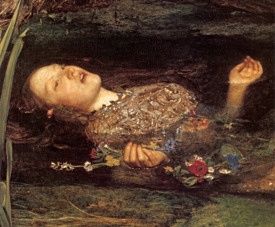 En als Miss Siddall maar lang genoeg in dit water ligt terwijl ik schilder, en vergeet waar ze is, dan krijg ik misschien juist de uitdrukking die ik zoek. Die van vergetelheid, van opgave, alsof ze op de wateren van de Lethe drijft. Misschien helpt een beetje laudanum. En ze is mooi genoeg om ook dan nog begeerlijk te zijn. Want dat is waarom het gaat. Ophelia moet in haar dood begeerlijk zijn. Want alleen dan is het tragisch dat niemand haar ooit zal beminnen.
En als Miss Siddall maar lang genoeg in dit water ligt terwijl ik schilder, en vergeet waar ze is, dan krijg ik misschien juist de uitdrukking die ik zoek. Die van vergetelheid, van opgave, alsof ze op de wateren van de Lethe drijft. Misschien helpt een beetje laudanum. En ze is mooi genoeg om ook dan nog begeerlijk te zijn. Want dat is waarom het gaat. Ophelia moet in haar dood begeerlijk zijn. Want alleen dan is het tragisch dat niemand haar ooit zal beminnen.
Hij vroeg zich af wie van hen Miss Siddall als eerste bezitten zou. Ik niet, dacht hij, ze is zo kwetsbaar, daar zit je voor de rest van je leven aan vast. Hunt was te rechtschapen, die zou alleen met zijn wettige echtgenote naar bed gaan. En Deverell ook niet. Walter was idolaat van haar, maar hij was een ziek man. Het zou Dante wel zijn. Lizzie was Dante’s meisje.
Nog een fragment uit: ‘Lizzie’
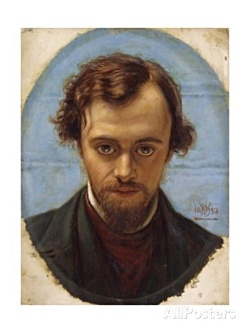 Ik ben Rossetti,’ zegt hij en ik hoor zijn stem vertraagd, alsof hij weerkaatst wordt door een gewelf. ‘Mijn naam is Dante Gabriel Rossetti, u zult wel nooit van mij gehoord hebben. Ik ben dichter en schilder.
Ik ben Rossetti,’ zegt hij en ik hoor zijn stem vertraagd, alsof hij weerkaatst wordt door een gewelf. ‘Mijn naam is Dante Gabriel Rossetti, u zult wel nooit van mij gehoord hebben. Ik ben dichter en schilder.
Er is een beweging, de Prerafaëlitische Broederschap… zo noemen we ons… waarvan ik de leider ben. En nu ik u heb gezien, wil ik u vragen…’
Als een mens ooit werd opgetild van de aarde, dan werd ik het, nu. Ik wist niet wat me overkwam. Maar ik wist wel wat ik nu wilde zeggen…
Ze glimlachte en reciteerde – bevangen, als iemand die onwennig op een bruiloft of uitvaart spreekt en bang is iets verkeerds te zeggen – twee van zijn eigen verzen, uit ‘The Blessed Damozel’:
I’ll take his hand and go with him
To the deep wells of light…
Hij knielde voor haar en kuste haar hand. Het was voor het eerst in haar leven dat een man voor haar knielde. Nu mocht en kon er niets meer gezegd worden.
In de deuropening draaide hij zich om. Ze zat nog steeds op haar stoel, haar ene hand op het tafelblad, blank en haast doorschijnend, als door een Hollandse meester geschilderd. Ze keek over haar schouder naar het beroete raam, dat nauwelijks licht doorliet, en scheen weer onbereikbaar, in haar eigen gedachten verzonken. Was ze zo, of poseerde ze? Wat het ook was, ze deed het goed.
Voordat Dante de deur weer sloot, maakte hij met zachte stem de strofe af:
As unto a stream we will step down,
And bathe there in God’s sight
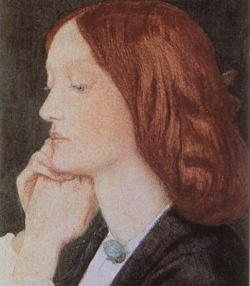 Eva Wanjek:
Eva Wanjek:
Lizzie
paperback met flappen
15×23 cm.
464 pagina’s
ISBN 9789028426160
prijs € 24,95
Uitgeverij Wereldbibliotheek
Johannes Vermeerstraat 63, 1071 DN Amsterdam
Tel: 020 570 61 00
Fax: 020 570 61 99
E-mail: info@wereldbibliotheek.nl
fleursdumal.nl magazine
More in: *The Pre-Raphaelites Archive, - Book News, Archive W-X, Lizzy Siddal, Rossetti, Dante Gabriel, Siddal, Lizzy
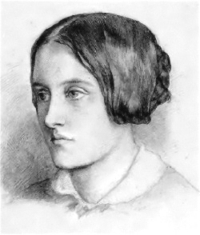
Christina Georgina Rossetti
(1830-1894)
Remember
Remember me when I am gone away,
Gone far away into the silent land;
When you can no more hold me by the hand,
Nor I half turn to go yet turning stay.
Remember me when no more day by day
You tell me of our future that you planned:
Only remember me; you understand
It will be late to counsel then or pray.
Yet if you should forget me for a while
And afterwards remember, do not grieve:
For if the darkness and corruption leave
A vestige of the thoughts that once I had,
Better by far you should forget and smile
Than that you should remember and be sad.
Christina Georgina Rossetti poetry
fleursdumal.nl magazine
More in: Archive Q-R, Rossetti, Christina
Thank you for reading Fleurs du Mal - magazine for art & literature